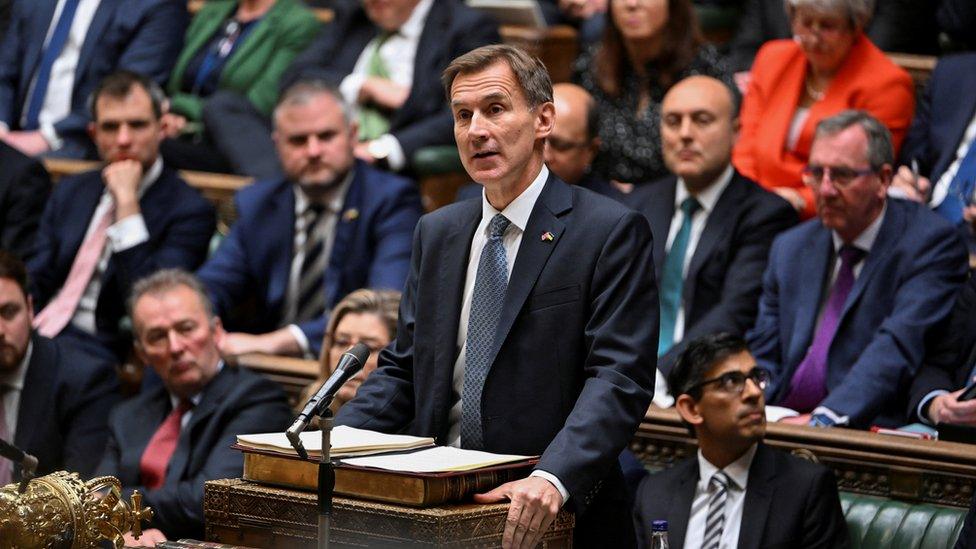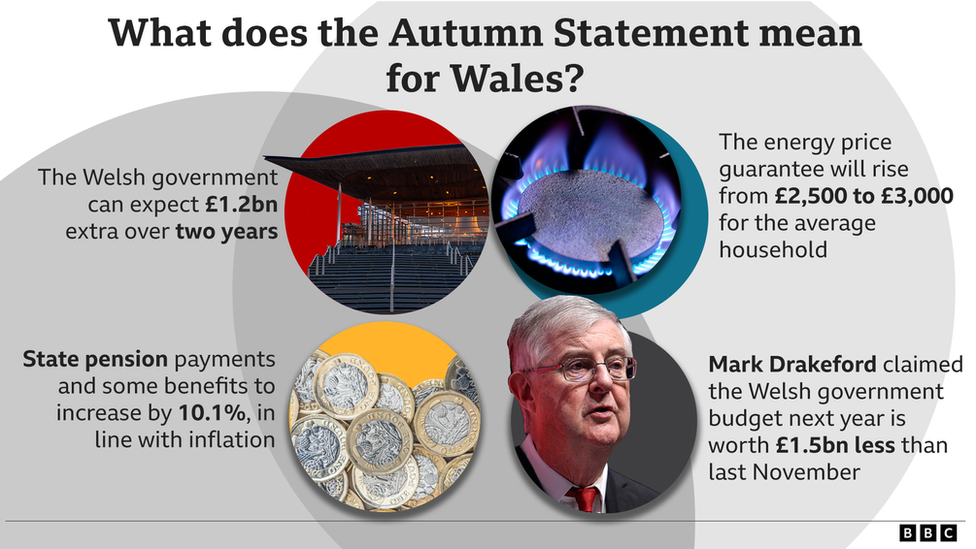Autumn Statement: What does it mean for Wales?
- Published

Jeremy Hunt said his autumn statement was a 'balanced plan for stability'.
The chancellor has set out his tax and spending plans, confirming the UK is in a recession.
With thresholds frozen many will pay more in income tax as pay rises.
The Welsh government can expect £1.2bn extra over two years, but Labour ministers are unlikely to say it is enough to cover inflation.
The energy price guarantee will rise from £2,500 to £3,000 for the average household, with payments for people on low incomes.
Those on benefits and pensions can expect them to increase by inflation next year, while the National Living Wage will rise by 9.7%.
Chancellor Jeremy Hunt said: "This is a balanced plan for stability, a plan for growth and a plan for public services."
Labour Welsh government Finance Minister Rebecca Evans said she was "really disappointed" by an Autumn Statement which "just doesn't come close to meeting the gap that we've identified in public service provision".
"That's because mainly because of inflation and the impact that that's having on the overall Welsh government budget," she told BBC Wales.

Cardiff University researchers warned the autumn statement leaves Welsh government ministers with difficult decisions.
Income tax
The freezing of the point that people start to pay income tax means that many will pay more in tax as their wages rise.
Jeremy Hunt announced that the personal allowance threshold will be held at £12,570, and the higher rate will stay at £50,270, until 2028.
That is two years longer than already planned. The national insurance threshold will also stay the same.
Currently there are 1,490,000 income tax payers in Wales, with 1,290,000 paying the basic rate and 166,000 on the higher rate.
Those on the top rate will see their threshold fall from £150,000 to £125,140.
Currently only 9,000 pay the additional rate in Wales, although that is likely to grow.
The Welsh government could vary the rates themselves in Wales, but never has since it had the powers .
Minimum wage, benefit and pensions
The legally-mandated minimum wage rate, known as the National Living Wage, will rise by 9.7% to £10.42.
The UK government said it would benefit 110,000 people in Wales.
Working age benefits will rise by 10.1%, and pensioners will receive an inflation-matching rise in the state pension and pension credit.
A UK government survey in 2020-21 suggested that Wales had more people in receipt of state support that any other UK nation - 56% versus 52% for the UK as a whole.
What does it mean for Welsh public services?
The way funding works in the UK means that rises in spending in England means extra cash for the Welsh government.
It funds the NHS, social care, councils and other services in Wales.
The UK government says Welsh ministers will have an extra £1.2bn to spend over two years, from 2023-2024 to 2024-25.
Its annual budget is worth around £20bn, but Welsh ministers say soaring inflation has wiped out a big chunk of their spending power, with Labour ministers expected to set out their spending plans in December.
The Wales Governance Centre at Cardiff University said the money could offset "about four-fifths" of a over £500m hit inflation has taken to the government's budget in 2024-25.
"But this still leaves a big budget shortfall in the meantime. There will still be plenty of difficult decisions for the Welsh government at next month's budget," the centre's Cian Sion wrote, external.
Plaid Cymru's Ben Lake said: "Let's be clear - pressures on Welsh public services will continue to worsen after today's statement due to inflation."
But Tory Chief Secretary to the Treasury John Glen said the Welsh government was getting a "significant additional sum of money".
Mr Glen told reporters: "I think that there is a very significant settlement for the Welsh government that amplifies the advantages of the decisions we've taken in Whitehall and gives them a significant way of mitigating some of the pressures they face."
Mr Glen - who said he has spoken to Welsh Finance Minister Rebecca Evans three times since he was appointed - denied that the Autumn Statement was a return to austerity, saying it would reduce the size of the recession "and we hope the length of it".
But a Welsh Conservative MP told the BBC they were unhappy with the tax rises announced.
"This is fiscal drag, employed to increase tax revenue by stealth," he said. "It's a straightforward Gordon Brown-Tony Blair New Labour trick and it's not the way a Conservative chancellor should be behaving".
Conservative Welsh Secretary David TC Davies said: "The difficult and necessary decisions taken today aim to tackle inflation and restore confidence and stability in the UK economy."
Energy - on and off-grid
Those who benefit from the energy price guarantee will face potentially higher charges as the cap rises.
Bills will be limited to an average of around £3,000 from next April, rather than the current £2,500.
Households on means-tested benefits will get £900 support payments next year, while £300 payments will be made to pensioner households, and £150 for individuals on disability benefit.
Those who are off-grid, which includes many in rural Wales, and use heating oil, LPG, coal or biomass will benefit from a doubling in support from £100 to £200.
Welsh Secretary David TC Davies previously admitted that the £100 payment was not generous.
Related topics
- Published17 November 2022

- Published17 November 2022
